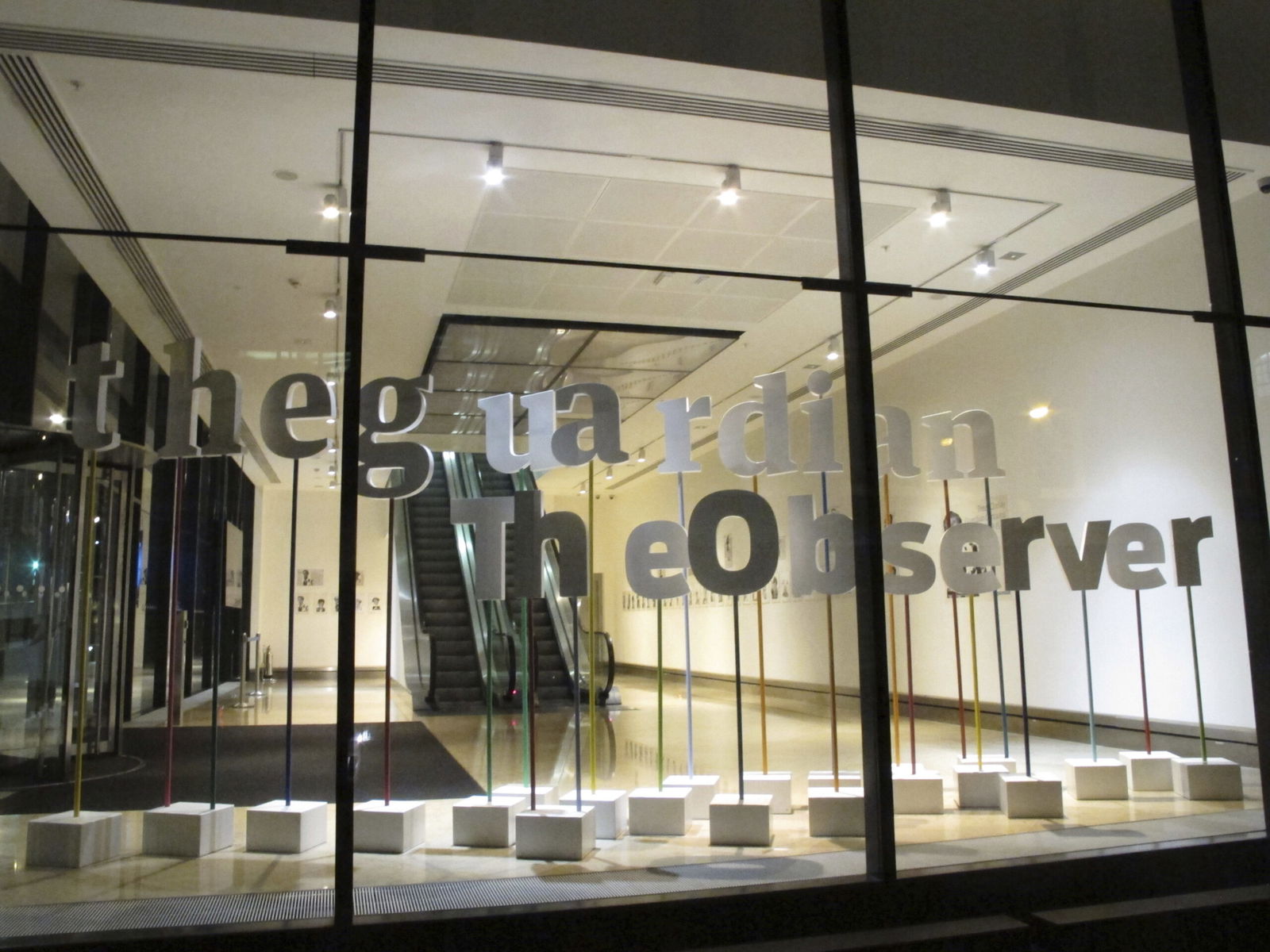Around the World briefs

By Associated Press
World’s oldest Sunday newspaper,
the UK’s Observer, sold in face
of journalistic opposition
LONDON | The owner of Britain’s Guardian newspaper confirmed Wednesday that it has sold The Observer, the world’s oldest Sunday newspaper, to Tortoise Media for an undisclosed fee.
The Scott Trust, which owns the Guardian Media Group, said in a statement that Tortoise Media is purchasing The Observer through a combination of cash and shares.
The Observer, which was founded in 1791 and became part of the Guardian Media Group in 1993, is a bastion of liberal values in Britain’s media landscape. Tortoise has promised readers that it will honor the paper’s historic values.
Tortoise was launched in 2019 by James Harding, a former editor of the London Times and director of news at the BBC, and the former U.S. ambassador to London, Matthew Barzun.
“The Observer has a historic place in the world of journalism and a special place in the heart of its readers,” said Harding. “We’re excited to put all we have into making sure its values, interests and passions reach even more people in the many years to come.”
As part of the deal, Tortoise has agreed a five-year commercial agreement with GMG, which will see it pay for both print and distribution services, as well as marketing through the Guardian.
The Scott Trust will also take a 9% stake in Tortoise Media and commit 5 million pounds ($6.3 million) into Tortoise Media as part of the 25 million-pound investment, much of which will be focused on establishing The Observer’s own digital identity — currently its online presence is very much secondary to that of the Guardian’s.
“This deal secures fresh investment and ideas for the Observer that will take the title to new audiences and enhance the role liberal journalism plays in our society,” said Ole Jacob Sunde, chair of the Scott Trust.
Tortoise said that the first Observer edition under its ownership is expected to be published in the spring.
It was also announced that Lucy Rock has been appointed the print editor of the Observer, the first woman to oversee the newspaper in 100 years. She will work alongside a digital editor, as the Observer builds its own online brand. Rock will report to Harding, who will be editor-in-chief.
The proposed sale has been opposed by journalists across the Guardian Media Group, culminating in a 48-hour strike earlier this month.
Tortoise has committed to meet all the key employment terms for any members of staff, as well as freelancers and contributors, who wish to continue to work on The Observer.
Harding said he respected that “people have had different views on the best way forward” for the Observer.
Injured spelunker carried to
safety in northern Italy after
being trapped for 75 hours
MILAN | An injured cave explorer in northern Italy was carried to safety Wednesday, 75 hours after she fell while attempting to map an unexplored branch of the Bueno Fonteno cave, alpine rescuers said.
The last leg of the rescue operation proceeded more smoothly than expected, and workers carrying 32-year-old Ottavia Piana strapped into a stretcher reached the cave’s mouth in the early morning hours. It was her second time in 17 months to be rescued from the cave near Lago d’Iseo northeast of Bergamo.
Piana suffered multiple fractures, including to her face, ribs and knee, when she fell 13 feet while exploring an uncharted part of the cave on Saturday, doctors said. The Bueno Fonteno cave is located some 500 yards below ground, with the mapped area reaching nearly 12 miles.
Removal through the narrow, uncharted part of the cave was especially harrowing. Video showed her wrapped in blankets and strapped to a stretcher being passed through narrow passageways by a team of helmeted rescuers, which included doctors and nurses on rotation. They stopped every 90 minutes to assess her condition.
By late afternoon on Tuesday, they reached the main tunnel and the final passage went much more quickly than anticipated, arriving at least 12 hours before expected.
Nearly 160 technicians from 13 Italian regions assisted in the round-the-clock rescue launched at midnight Saturday, after being alerted by members of her team that she was injured and trapped deep inside the tunnel.
Nigerians press for solar jobs and electricity, with little success
BAKU, Azerbaijan | In sun-drenched Nigeria, 14 new solar farms were supposed to jumpstart a meager solar industry and generate huge amounts of power, about one-fifth as much as the country’s entire electric grid offers on a good day.
“We were very excited because we were pioneers,” said Najim Animashaun, managing director of Nova Solar Power, who was working on one of the projects in 2016.
But that ambition collapsed when Nigeria’s government wouldn’t provide critical guarantees to developers. It’s not that demand is low for clean power — the smallest solar systems for homes have exploded in popularity and created jobs — but big developers haven’t been able to overcome Nigeria’s reputation as a risky place to do business.
It’s a problem across sub-Saharan Africa, where 83% of the people in the world who lack electricity live. Despite tremendous solar potential, very little of it has been installed.
“Many of your countries face sky-high borrowing costs, runaway debt, and inadequate climate finance and investment,” said António Guterres, the United Nations secretary-general, at a panel on Africa’s green transition at this year’s global climate negotiations in Baku, Azerbaijan.
The result, he said, is: “your clean energy revolution held back.”
Nigeria may be the problem’s epicenter. More Nigerians live without electricity than citizens of any other country. Their numbers have even grown compared to a decade ago: Africa’s most populous country, with more than 220 million people, grew faster than its power sector expanded. Even those connected to the grid live with frequent outages. Millions are forced to rely on wood for cooking and noxious, noisy diesel generators for sporadic electricity.
At the climate talks in Baku, at least $300 billion annually was pledged to help developing countries like Nigeria transition away from fossil fuels and cope with a warmer world and its more extreme weather. It was blasted by many developing nations as far too little.
Having enough funds will be vital for Nigeria, which is facing an enormously challenging energy transition. It is an oil state, a major petroleum exporter that runs its government largely on oil revenue. It burns natural gas for most of its electricity. It is trying to simultaneously expand its economy to pull tens of millions of people out of poverty and transition to net-zero by 2060. To do so, there will need to be a flood of new renewable projects like solar and hydropower.
Animashaun of Nova Solar Power said in the years before the 14 solar projects were announced, Nigeria opened its electric sector to attract more private investment and made it easier for new producers to sell power. There was strong investor backing, too. He was optimistic.
“There was a proliferation of projects and that proliferation of projects created competition among ourselves,” he said. Everybody wanted to be first to finish.
But Nigeria has high interest rates and is considered a financially problematic place to do business and the deal never closed. As the solar industry matured and prices dropped, the government tried to get out of an agreement to pay what it viewed as too high a price for solar power. Developers couldn’t get the guarantees they wanted from officials and international development banks. Animashaun said he knew the deal was in serious jeopardy when the government proposed a deal in local currency instead of dollars.
“The currency has lost 90% of its value since I started this project,” he said. “So, Nigeria isn’t really bankable.”
A wholly inadequate grid leads to demand for any electricity at all
With the Nigerian grid providing only a fraction of the electricity that people need, some employ a solar solution that provides at least some power. Micro-solar systems that power only lights and perhaps charge a cell phone tripled from 2016 to 2023, according to GOGLA, an off-grid energy industry association. Sales of small rooftop systems that can run some appliances increased even more, although sales did fall off some when a subsidy program ended this year.
Sun King is a major seller of these small devices that can replace dirty and expensive kerosene lamps or diesel generators.
The micro-solar industry also requires a big workforce at a time when Nigeria’s young population needs jobs. Olamide Ayo-Ogunlade is the human resources lead for West and Central Africa at Sun King. When she started four years ago, the company had 19 stores in the country, now it has 90. More than 8,000 salespeople or “energy officers” in Nigeria sell the products, install them in homes, service them and collect customer debts.
“Most of the time we find that energy officers start off as customers,” she said. “They buy the product themselves, see how fantastic it is, then they are exposed to the opportunity to be an entrepreneur in the energy space.”
They’ll knock on doors and show up at markets, churches and mosques in new areas to make sales. Energy officers are trained, in person and online, on the company and its products and they work with mentors.
That attention to training matters. Across the region, some question solar’s reliability, according to Siré Diallo, an energy and climate finance expert with the United Nations Development Programme.
“Many of the installations that are being done, the consumers were not satisfied because either it was poor installation, or the equipment itself was of low quality,” he said.
It has gotten better in recent years, he said, but training programs need to grow.
There’s certainly demand for jobs, said Akin Olukiran, CEO of ABG-CAPS Clean Energy Generation, which installs solar systems for businesses.
“I get on average about 10, maybe 20 applications per day, unsolicited,” he said, adding many applicants have tremendous potential and he tries to help them find opportunities, but “the jobs are not there.”
Alberto Rodríguez Gómez, manager in the Africa energy program at the nonprofit Rocky Mountain Institute, says a planned changeover at the the largest market in Nigeria’s capital city illustrates one solution that produces reliable electricity, improvements in air quality, plus employment. Solar panels paired with batteries will keep the market running on its own minigrid even during common blackouts.
Up until now, sellers laboring in cramped stalls have no alternative but to turn on diesel generators during frequent outages.
“I struggle because the air is thick, the air is nasty, it is also very noisy so it is also really hard to just maintain a conversation,” Gomez said of the market when the generators run. A future with solar at the market “is like going from hell to heaven.”
A new $750 million program was approved by the World Bank last year to improve electricity access to 17.5 million Nigerians by supporting projects like microgrids or small home solar systems. Much more is needed.
Animashaun believes that Nigeria is approaching a “come to Jesus moment” on energy — there’s pressure on the government to deliver at a time when living costs are rising.
“If you want to avoid social unrest, you have to do something,” he said.
Not quite the ‘Girl from Ipanema’,
a fur seal’s rare appearance on
Rio’s famous beach turns heads
RIO DE JANEIRO | Short, and dark, and young, and tired, the seal on Ipanema was basking …
The fur seal on Rio de Janeiro’s iconic beach was turning heads of locals and tourists alike Wednesday morning — though not for the same reasons as the famous “Girl from Ipanema.”
The animal is often spotted along Brazil’s coastline during winter and spring, but rarely is it seen this time of year, a few days before the start of the Southern Hemisphere’s summer, said Suelen Santiago, a biologist who works at the company that monitors the beach.
“This year we’re having atypical situations,” she said.
Cordoned off by tape and flags, the young male seal became the main attraction on one of the world’s most famous beaches. Among the curious onlookers was Jordana Halpern, 29. She had never seen such a specimen and rushed to the beach when she heard it had been spotted.
“It’s cool, but it’s kind of sad. It seems like it’s not doing very well,” Halpern said. Almost as though hearing her, the seal moved more energetically, lifting its head and emitting a low sound. “Oh my God! It moved a lot!” Halpert said.
Santiago said they still don’t know why the animal ended up in Ipanema out of season, but wasn’t worried: “It’s just resting. The animal is very active, so he’s only resting, and soon it’ll head back to the sea.”
—From AP reports


